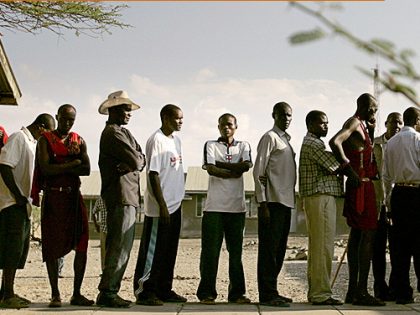A man of few words
Late Kenyan President, Mwai Kibaki, could be a political heartbreaker and a great disappointment when he moved smoothly on from a cause.

President Mwai Kibaki with Catherine Ashton. Image via European External Action Service on Flickr CC BY-NC-ND 2.0.
We have reached a phase in Africa’s post-independence history where we cannot off the top of our head count the number of retired heads of states who are living peacefully at home or have quietly passed on into the great beyond. This is no mean achievement for the continent. Following independence from colonial rule, presidential transition was one of the things we in Africa often did badly; the tradition had long been for leaders to be shot out of power. This has changed. The eulogizing through gritted teeth of the 1970s has given way to far more elaborate and socially reassuring mourning processes. We have come a long way.
Last week Kenya and the region laid to rest Mwai Kibaki, the country’s third president since independence. Many have reached out to me for comment or to write an obituary about him. I decided not to until the funeral was over and those essential rituals had been concluded by family and nation. It’s our African way. Others sought not my comments on my time with Kibaki but some sensational attack. I explained to one, “I don’t hate Mwai Kibaki, I never have. He isn’t a man who caused me to hate; he is someone who broke my heart.”
I had the honor of working for Mwai Kibaki from the beginning of 2003 until 2005—the shortest stint in any job during entire my professional career. Kibaki employed me as his permanent secretary in the Office of the President in charge of Governance and Ethics. I had an office at State House, in part signifying the fulfillment of the campaign promise Kibaki had made to deal with corruption once he took office. At 38, I was truly excited by this honor to serve my country and the head of state. Being based at State House was a huge deal in the Kenyan political context. Random people would walk up to me and narrate long stories of their travails at the hands of, say, the judiciary, which they felt I could resolve simply because I “sat at State House.” We set up a Public Complaints Unit (PCU) to handle this and the rest of what became a flood of requests, entreaties, complaints and narrations of woe that, in particular, were directed to the president by ordinary wananchi at their wits end. The PCU was transformed into the Ombudsman’s office that was originally based at Cooperative Bank Building.
In my exuberance I had forgotten my own previous writings on the intrigues and machinations that took place in that house. Within a year, I realized that what I had considered a perk was no longer a perk at all. As time passed, I was reminded that while much that was good emanated from this seat of power, often too, a darkness also arose from this place that sprung from the most craven of our desires and our base greed. I came to discover that a drought was a business opportunity for some, that the reason the caps of policemen were falling part in the rain was a contract. Even the sausages, mandazis and bottles of mineral water that were served to us so efficiently could often be a racket. Shocked not only by the price the government was paying for mineral water but also by the utter resilience of the racket that was forcing his ministry to buy the water at five-star hotel prices, one minister took to buying his own water from Uchumi Supermarket.



